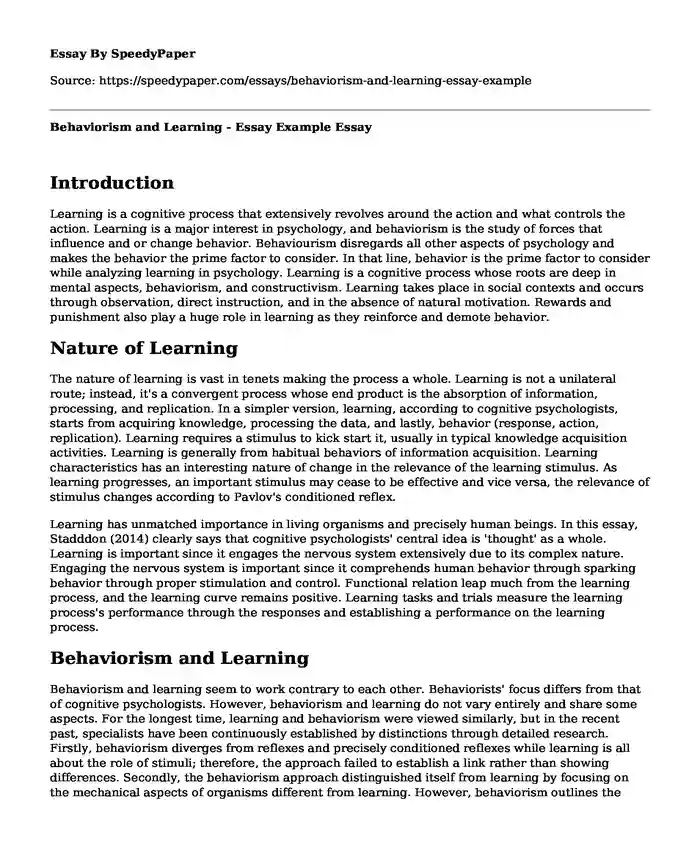Introduction
Learning is a cognitive process that extensively revolves around the action and what controls the action. Learning is a major interest in psychology, and behaviorism is the study of forces that influence and or change behavior. Behaviourism disregards all other aspects of psychology and makes the behavior the prime factor to consider. In that line, behavior is the prime factor to consider while analyzing learning in psychology. Learning is a cognitive process whose roots are deep in mental aspects, behaviorism, and constructivism. Learning takes place in social contexts and occurs through observation, direct instruction, and in the absence of natural motivation. Rewards and punishment also play a huge role in learning as they reinforce and demote behavior.
Nature of Learning
The nature of learning is vast in tenets making the process a whole. Learning is not a unilateral route; instead, it's a convergent process whose end product is the absorption of information, processing, and replication. In a simpler version, learning, according to cognitive psychologists, starts from acquiring knowledge, processing the data, and lastly, behavior (response, action, replication). Learning requires a stimulus to kick start it, usually in typical knowledge acquisition activities. Learning is generally from habitual behaviors of information acquisition. Learning characteristics has an interesting nature of change in the relevance of the learning stimulus. As learning progresses, an important stimulus may cease to be effective and vice versa, the relevance of stimulus changes according to Pavlov's conditioned reflex.
Learning has unmatched importance in living organisms and precisely human beings. In this essay, Stadddon (2014) clearly says that cognitive psychologists' central idea is 'thought' as a whole. Learning is important since it engages the nervous system extensively due to its complex nature. Engaging the nervous system is important since it comprehends human behavior through sparking behavior through proper stimulation and control. Functional relation leap much from the learning process, and the learning curve remains positive. Learning tasks and trials measure the learning process's performance through the responses and establishing a performance on the learning process.
Behaviorism and Learning
Behaviorism and learning seem to work contrary to each other. Behaviorists' focus differs from that of cognitive psychologists. However, behaviorism and learning do not vary entirely and share some aspects. For the longest time, learning and behaviorism were viewed similarly, but in the recent past, specialists have been continuously established by distinctions through detailed research. Firstly, behaviorism diverges from reflexes and precisely conditioned reflexes while learning is all about the role of stimuli; therefore, the approach failed to establish a link rather than showing differences. Secondly, the behaviorism approach distinguished itself from learning by focusing on the mechanical aspects of organisms different from learning. However, behaviorism outlines the importance of learning; behaviorists emphasize the importance of learning about an organism's mechanism. Learning can have a direct influence on behaviors and cause alterations in behaviors. Behaviorists and cognitive psychologists have established evident interdependence between behaviorism and learning and show the duo's clear-cut differences.
Conclusion
Personal factors, the natural environment, and behavior interrelate and are dependent on each other. For example, teacher feedback in a classroom setting can reinforce students to work harder and earn higher goals. The desire for good marks will motivate a c student to aim higher and put effort into studies. Giving positive feedback serve as environmental factors; a child setting a higher goal is a personal factor, and putting effort to achieve the goal is behavior influenced. Such an elaboration illustrates how behavior, individual characteristics, and environment influence learning the learning process.
References
Staddon, J. (2014). The new behaviorism. Psychology Press.
Cite this page
Behaviorism and Learning - Essay Example. (2024, Jan 11). Retrieved from https://speedypaper.com/essays/behaviorism-and-learning-essay-example
Request Removal
If you are the original author of this essay and no longer wish to have it published on the SpeedyPaper website, please click below to request its removal:
- Teaching Essay Sample: Reading Mini-Lessons
- Spirituality in the Workplace - Literature Review Paper Sample
- Essay Sample: E-learning vs. Traditional Education
- Essay Example: Use of the Balanced Scorecard in Health Care
- Free Essay: Personal Statement
- Essay Example on A Case Analysis on Patient's Spiritual Needs
- Offenders With Special Needs - Free Paper Sample
Popular categories





